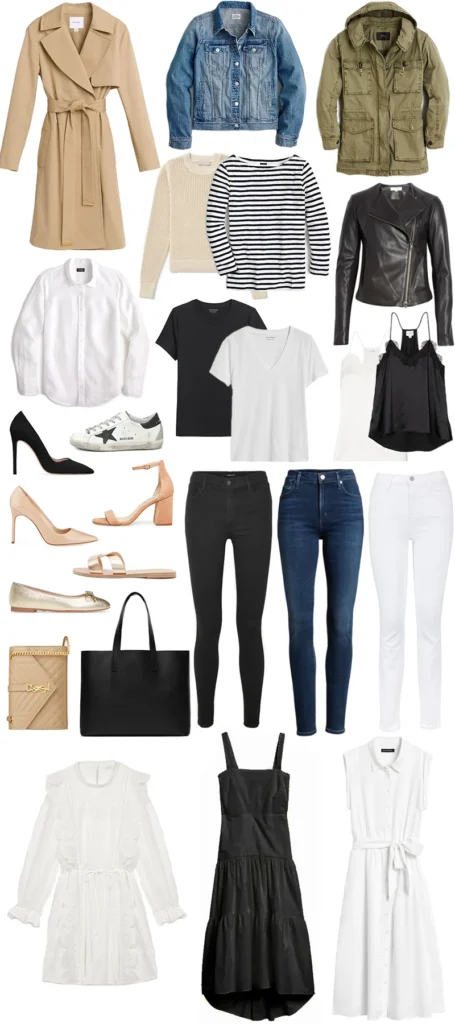Sustainable fashion is rapidly redefining the landscape of the clothing industry, offering consumers an eco-friendly alternative that combines style with responsibility. At the forefront of this movement is Amy Powney, a visionary designer known for her dedication to ethical fashion choices through her newly launched brand, Akyn. In an era plagued by greenwashing in fashion, Powney’s commitment shines as she aims to produce garments that are traceable, organic, and socially responsible. By making sustainable practices both accessible and exciting, she challenges the status quo and inspires consumers to consider their purchasing decisions carefully. The approach she embodies serves as a beacon for those seeking to embrace eco-conscious fashion without compromising on aesthetics or quality.
The emergence of eco-conscious apparel has shifted significant attention towards sustainable practices within the fashion sector. This trend emphasizes ethical considerations in clothing production, promoting an increasing awareness of the environmental impacts associated with garment manufacturing. As leading designers like Amy Powney take actionable steps toward offering greener alternatives, brands like Akyn are setting a new standard for responsible fashion. With awareness surrounding the pitfalls of greenwashing becoming more pronounced, the demand for clarity in sustainable practices is ever-increasing. Ultimately, this movement is empowering consumers to make informed choices, aligning their wardrobes with their values for a better tomorrow.
Amy Powney: A Leader in Sustainable Fashion
Amy Powney is changing the narrative in sustainable fashion, breaking through the barriers of conventional design to prioritize eco-friendly practices. With her brand Akyn, she aims to redefine elegance while ensuring that every piece of clothing is crafted with ethical sourcing and sustainability at its core. By making informed choices about materials and production methods, Powney is a beacon of hope in an industry often marred by greenwashing. Her vision not only highlights the importance of sustainability but also encourages other designers and brands to follow suit, allowing consumers to make ethical fashion choices that have a real impact.
What sets Powney apart is her commitment to transparency and authenticity. In the fashion documentary “Fashion Reimagined,” she detailed her journey into creating a fully sustainable collection, showcasing the transformations that can occur when a designer takes responsibility for their supply chain. Her work challenges brands to reconsider their importance and influence within the industry, advocating for certified organic materials and fostering dialogues about ethical sourcing. By raising awareness about greenwashing in fashion, she inspires a new generation of designers and consumers to embrace true sustainability in their buying choices.
Decoding Greenwashing in Fashion
Greenwashing has become a pressing concern in today’s fashion landscape, where brands often exaggerate their commitment to sustainability to attract socially conscious consumers. This misleading practice makes it increasingly difficult for shoppers to discern between genuine eco-friendly brands and those that only appear to be sustainable. Powney’s candid discussions on the subject shed light on the confusion consumers face when navigating the market, emphasizing the need for clearer communication and stricter standards to combat these deceptive practices. As awareness of sustainability grows, it is crucial for brands to move beyond marketing buzzwords and embrace real change.
The impact of greenwashing on consumer perception cannot be understated. Many shoppers are understandably hesitant to invest in brands that claim to be sustainable yet fail to provide transparency about their operations. Powney highlights this dilemma as she seeks to create a brand ethos that prioritizes education and authenticity. Her efforts aim to bridge the communication gap between fashion producers and consumers, encouraging a collective effort to support truly sustainable brands such as Akyn. By fostering an environment where mindful consumption is possible, Powney hopes to counteract the negative effects of greenwashing.
Akyn: A Sustainable Fashion Revolution
Akyn represents a fresh wave in sustainable fashion, grounded in community, craftsmanship, and conscious design. Powney’s vision for the brand combines stylish sophistication with an unwavering commitment to eco-friendly practices, showcasing that sustainable fashion can indeed be beautiful and desirable. The initial collection’s elegant pieces reflect her minimalistic aesthetic while also prioritizing sustainable fibers and production methods. This unique approach invites consumers to invest in fashion that not only looks good but also aligns with their values, emphasizing that one doesn’t have to sacrifice style for sustainability.
Furthermore, Powney’s approach to sustainable fashion includes a deep understanding of the complexities surrounding ethical choices. By prioritizing organic materials over synthetic fibers and shedding light on lesser-known practices such as fly striking and microns, she ensures that consumers can make informed decisions about their clothing. The narrative of Akyn revolves around quality over quantity, challenging the fast fashion model that dominates the industry today. As consumers become more educated about ethical fashion choices, Akyn stands out as a brand that embodies this shift.
The Importance of Transparency in Fashion Supply Chains
Transparency is paramount in fostering trust between consumers and brands, particularly in the fashion industry where ethical practices are often questioned. Amy Powney’s advocacy for open dialogues about sustainable sourcing encourages brands to disclose their entire supply chains, from raw material sourcing to end-of-life garment disposal. As she notes, consumers are increasingly aware of terms such as organic cotton and sustainable material but still need more information to grasp their significance fully. By prioritizing transparency, brands can not only establish credibility but also empower consumers to make informed choices.
Powney’s insistence on dialogue with suppliers rather than assuming compliance presents a paradigm shift in how the fashion industry operates. Her demand for certification and accountability promotes a culture where businesses actively pursue ethical practices rather than merely conforming to market trends. As Akyn navigates the complexities of sustainable fashion, this commitment to transparency will be fundamental in shaping consumer trust and loyalty. By setting an example in an industry often riddled with opacity, Powney is championing a movement where sustainable fashion is not just an afterthought but the standard.
Navigating Ethical Fashion Choices
Navigating the complexities of ethical fashion choices can be overwhelming for consumers. With the rise of sustainability conversations and numerous brands vying for attention, many individuals struggle to understand what defines true sustainability in their clothing selections. Powney aims to simplify this process by showcasing what real commitment to sustainability looks like within Akyn. By focusing on community, quality, and craftsmanship, she creates a framework for consumers to evaluate their own fashion decisions, steering them toward brands that genuinely prioritize sustainable values.
Education plays a crucial role in making ethical fashion choices accessible. Powney recognizes that consumers are eager to embrace sustainability but often lack the knowledge necessary to act accordingly. She emphasizes a need for straightforward, factual information about materials and production methods so consumers can confidently support brands that align with their ethical principles. As Akyn continues to grow, it will serve as a guidepost for consumers wanting to make conscious choices, encouraging them to view fashion through the lens of sustainability and responsibility.
The Role of Community in Sustainable Fashion
Community plays a vital role in the sustainable fashion movement, fostering collaboration and shared values among stakeholders. Powney’s brand, Akyn, encapsulates this philosophy by emphasizing kinship not only in design but also in the supply chain. By supporting local artisans and environmentally friendly practices, Akyn aims to build a network of like-minded individuals working toward a common goal of sustainability. This collaborative spirit not only strengthens the brand’s commitment to ethical practices but also redefines the relationship between consumers and producers.
Through community engagement, Powney envisions a more resilient fashion ecosystem where consumers are not just passive buyers but active participants in supporting sustainable practices. By creating opportunities for conversations around sustainable fashion, she hopes to inspire a collective mindset that values responsibility and shared success. In doing so, Akyn will not only highlight the beauty of thoughtfully designed garments but also encourage consumers to be advocates for ethical fashion in their own communities.
The Future of Sustainable Fashion: Hope and Challenges
While there are significant challenges in the sustainable fashion landscape, including affordability and greenwashing, there is also a burgeoning sense of hope. Designers like Amy Powney are paving the way for brands that approach sustainability with sincerity and commitment, demonstrating that it is possible to create beautiful garments without compromising ethical standards. The rise of brands like Akyn exemplifies this positive shift, as they cater to a growing audience seeking fashion that aligns with their values, emphasizing the demand for conscious consumption.
However, as sustainability becomes more mainstream, it is critical to be vigilant against practices that dilute its meaning. Powney’s insights serve as a reminder of the importance of maintaining a high bar for authenticity in fashion. The future of sustainable fashion hinges on the collective efforts of designers, brands, and consumers alike to champion true accountability and responsible practices, ensuring that ethical fashion choices become the norm rather than the exception.
Understanding Eco-Friendly Fashion Materials
The choice of materials is a crucial element in the quest for sustainable fashion, influencing everything from ecological impact to garment quality. Powney emphasizes the importance of sourcing organic fibers, which are less detrimental to the environment than conventional materials. By prioritizing eco-friendly fabrics, Akyn aims to demonstrate that style and sustainability can seamlessly coexist. Educating consumers on the benefits of sustainable materials helps foster a deeper understanding of the intricate relationship between fashion and the environment, empowering them to make more informed decisions in their purchasing habits.
Additionally, using innovative fabrics like lyocell, which is derived from wood pulp, showcases the possibilities within the realm of sustainable fashion. Powney’s commitment to researching and adopting such materials sets an example for others in the industry while illustrating a path toward eco-friendly fashion solutions. As awareness builds surrounding the impact of fabrics on the environment, it is essential for consumers to be equipped with knowledge about their choices. Brands like Akyn can play a vital role in providing this crucial information, thus influencing the future landscape of fashion.
Empowering Consumers Through Education
Empowering consumers through education is at the heart of transforming sustainable fashion from a niche market into a mainstream movement. Powney’s goal with Akyn is to facilitate an understanding of the complexities that surround ethical fashion choices, helping consumers navigate the often confusing landscape. By offering insights into the sustainable practices behind the products, she aims to make conscious purchasing more straightforward and accessible. This educational aspect fosters a sense of agency, encouraging shoppers to engage with brands that share their commitment to sustainability.
In a market flooded with fast fashion, providing consumers with the tools to recognize and support truly sustainable brands is more important than ever. Powney’s emphasis on transparency and accountability serves as a blueprint for others in the industry, cultivating an environment where informed consumers are empowered to make choices that reflect their values. By elevating the conversation around sustainable fashion and removing the barriers to understanding, brands like Akyn are poised to lead the way in shaping a more responsible fashion future.
Frequently Asked Questions
What is sustainable fashion and why is it important?
Sustainable fashion refers to the design, production, and consumption of clothing that minimizes environmental impact and promotes ethical labor practices. It is important because it addresses the significant waste and pollution created by the fast fashion industry, encouraging consumers to make ethical fashion choices that benefit both people and the planet.
Who is Amy Powney and how has she influenced sustainable fashion?
Amy Powney is a prominent fashion designer known for her commitment to sustainable fashion. As the creative director of Akyn and formerly of Mother of Pearl, she has made significant strides in promoting eco-friendly fashion practices, highlighted in her documentary ‘Fashion Reimagined’. Powney emphasizes transparency and ethical sourcing, making her a key figure in the sustainable fashion movement.
What is greenwashing in fashion and how can consumers avoid it?
Greenwashing in fashion is the practice of misleading consumers into believing that a brand’s products are more environmentally friendly than they actually are. To avoid greenwashing, consumers should research brands, look for certifications, and ask questions about the sustainability of products to ensure that they are making informed ethical fashion choices.
How does Akyn, founded by Amy Powney, contribute to sustainable fashion?
Akyn is a sustainable fashion brand founded by Amy Powney that focuses on ethical production and minimal environmental impact. The brand aims to create eco-friendly fashion by using organic materials and transparent supply chains, addressing the challenges of sustainability head-on while offering elegant, high-quality garments.
What are ethical fashion choices and how can I incorporate them into my wardrobe?
Ethical fashion choices involve purchasing clothing that is made with fair labor practices, sustainable materials, and environmentally friendly processes. To incorporate them into your wardrobe, consider buying from sustainable brands like Akyn, choosing secondhand clothing, supporting local artisans, and being mindful of your consumption habits.
| Key Point | Details |
|---|---|
| Greenwashing Awareness | Many brands claim sustainability without genuine practices, leading to consumer confusion. |
| Amy Powney’s Approach | Powney focuses on transparency in supply chains and educates consumers about sustainable fabrics. |
| Launch of Akyn | Her new brand emphasizes community and quality, aiming for a more sustainable fashion model. |
| Consumer Education | Powney aims to simplify the complexities of sustainable fashion for consumers. |
| Hope for Change | There is potential for larger brands to adopt sustainable practices at lower prices. |
Summary
Sustainable fashion is a critical conversation in today’s garment industry as it addresses the environmental and ethical concerns of modern consumption. Amy Powney stands out as a leader in this space, raising awareness about greenwashing while launching her own brand, Akyn, that embodies her vision for a responsible and stylish future. By focusing on transparency and community engagement, Powney aims to redefine how consumers perceive and engage with fashion, highlighting the need for genuine sustainable practices.




